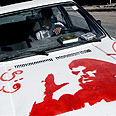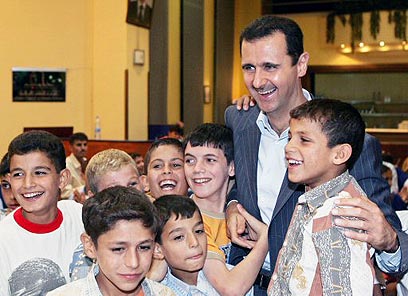
Syria: Sunnis converting to Shiites in homage to Nasrallah
Many Sunnis convert, join Shiite sect in appreciation of what they see as Hizbullah's victory against Israel. A weekly review of Arab newspapers
Mustafah al-Sada, a religious Shiite Muslim, told al-Arabia that many Sunnis are now asking him, "What must I do to become a Shiite?" Al-Sada said that he knows of 75 Sunnis from Damascus who have converted to the Shiite sect since the beginning of the war.
"George Bush has done us a favor," said al-Sada, "he has united the Arabs."

Assad and young Syrian supporters, this weekend (Photo: Reuters)
Munir A-Sayed, a 43 year old lawyer says: "I'm Sunni, but I belong to Hasan Nasrallah."
"I've converted politically," he explained.
For Wael Khalil, a 21 year old student of international law in Damascus, the change started when he watched the Arab television stations and saw "Hizbullah fighters defeating the Israeli troops easily."
According to Khalil, it was the first time he saw a war that the Arabs were winning.
Several years ago the residents of the town of Hatla, a five hour drive from Damascus and about 150 kilometers (about 93 miles) from the Sunni Anbar district of Iraq, gathered together and converted their sect from Sunni to Shiite.
"For five years we feared to announce that we had accepted the Shiite sect," said one of the men from the village, mentioning that following wider media coverage of Shiites these past few years, primarily in Iraq, the situation has improved.
According to reports, some officials in Damascus are not pleased with the trend, saying that it's a sign of Iran's growing influence in the region. However some political commentators have assessed that the Syrian regime is encouraging the increase in Nasrallah's popularity to hold up President Bashar Assad's own. In support of this claim, stickers have surfaced recently with images of Nasrallah and Assad together, as well as images of Iranian President Mahmoud Ahmadinejad.
Khaddam to Syrian army: Abandon Assad family
The attempts to strengthen Assad are apparently necessary, there are those who seek to remove him from power. On Friday Syrians marked the anniversary of the "October War" (the Yom Kippur War) and former Syrian Vice President Abdel Abed al-Halim Khaddam used the opportunity to call for mutiny in the armed forces against the regime.
In a letter to the Syrian army Khaddam, who defected to France to form a "government in exile," said that the army is now faced with "a historic decision".
According to Khaddam, the Syrian regime has reached the end of the road and all the army has to do now is choose a side: the regime or the homeland.
"Your decision to stand with the regime is a great loss for you and for the homeland," wrote Khaddam in the letter obtained by UPI.
Khaddam also spoke directly against the late President Hafez Assad, claiming that his policies since 1973 only weakened Syria.
The 'October War'
Egypt also marked the Yom Kippur War, though this year the anniversary took a beackseat to the Ramadam and the 25th anniversary of President Anwar Sadat's assassination. Mohammed Basyouni, former Egyptian ambassador to Israel, stated in an editorial to the al-Ahram newspaper what was always well known.
"The effects of each holiday on the IDF's recruitment capabilities were studied and it was found that Yom Kippur was the only day where radio and television stations don't broadcast, making a speedy public recruitment impossible," he wrote.
President Mubarak also addressed the war in an interview to the military newspaper al-Quwwat al-Musallaha, stating that the armed forces are "in the highest level of readiness to carry out any mission."
He warned that the region might be dragged into a new war is the peace process remains frozen.
Mubarak again addressed the issue of building a nuclear plant, saying that "no one can take away our right to act in this manner on the strategic issue in question. We will make decisions according to what is best for national interests and for our sons."
And al-Manar? Still in hiding
Despite the time which has passed since the end of the war in Lebanon it seems that Hizbullah continues to operate on high alert, just in case.
Chief of the Hizbullah television station al-Manar, Abdallah Kassir, revealed that the station turned down offers to broadcast from other capitals during the war.
"We preferred to stay with our families and fight so that al-Manar's voice would not be silenced," he said.
Kassir revelaed that the station continues to broadcast from its hiding place which was built during the first week of the war, two days after their main building was destroyed by the Israel Air Force. The al-Quds al-Arabi newspaper reported that the station suffered from numerous setbacks during the fighting but the Hizbullah leadership decided to continue the broadcasts at any cost.
As for the war itself, Hizbullah claims that only 800 fighters took part in the battles against the IDF and that only 150 of these fighters were killed. The organization estimates that it used only 6 percent of its armed forces and additional forces were ready to go into combat behind enemy lines. Kassir announced that in the coming days more details would emerge about "the truth about the Israelis on the battlefield."










